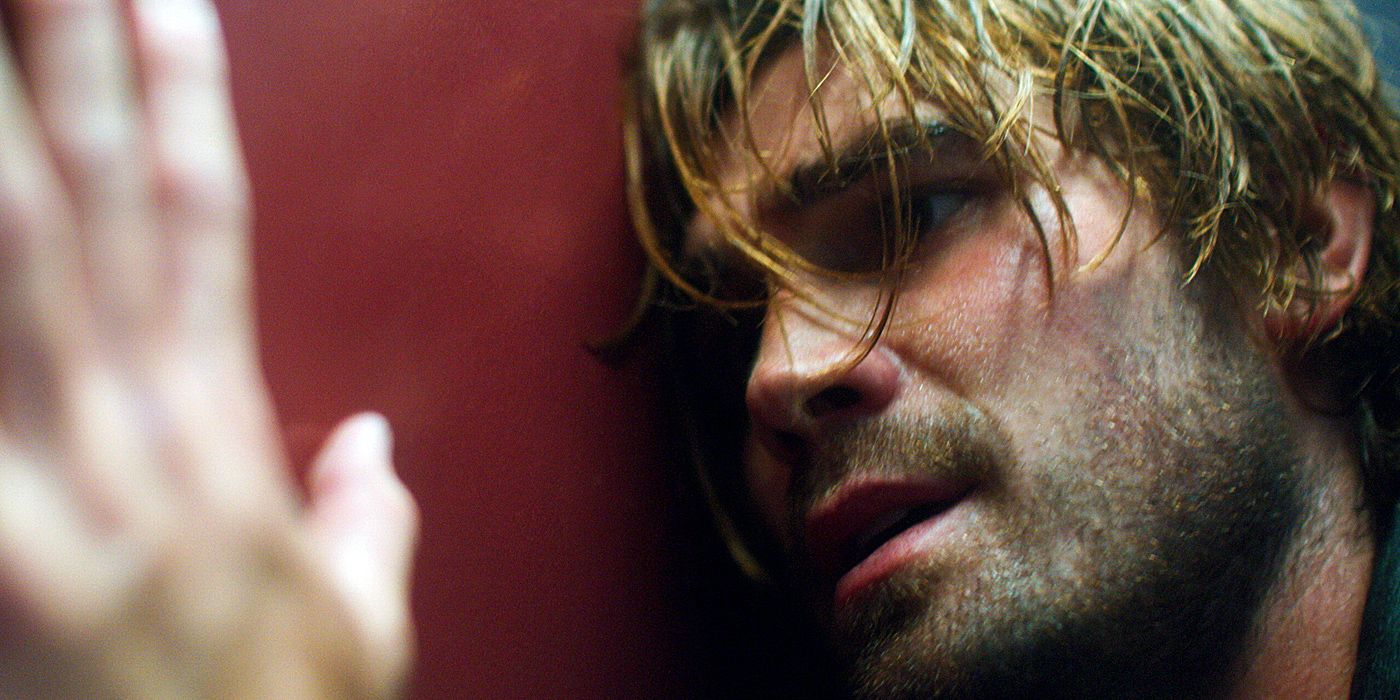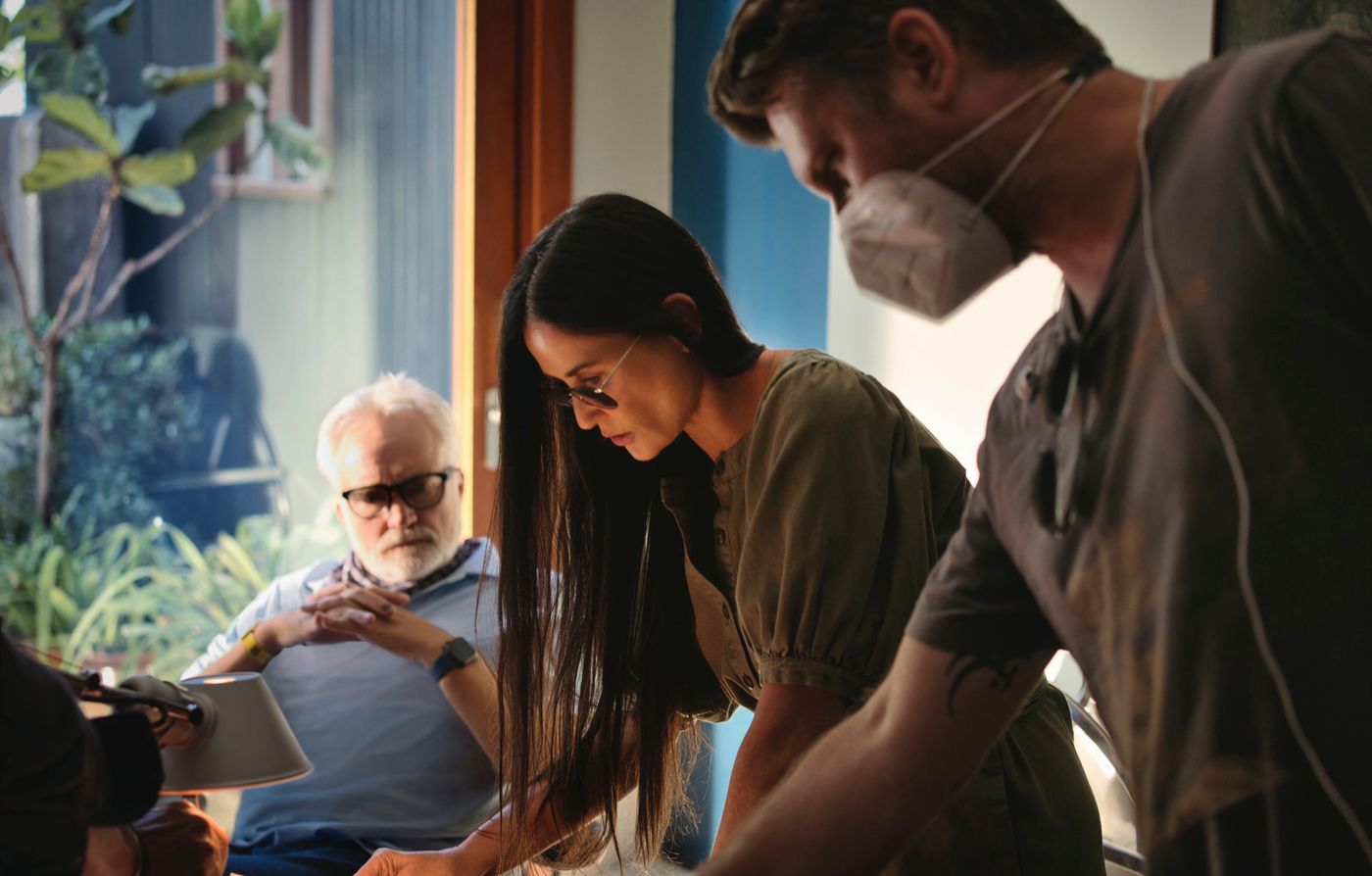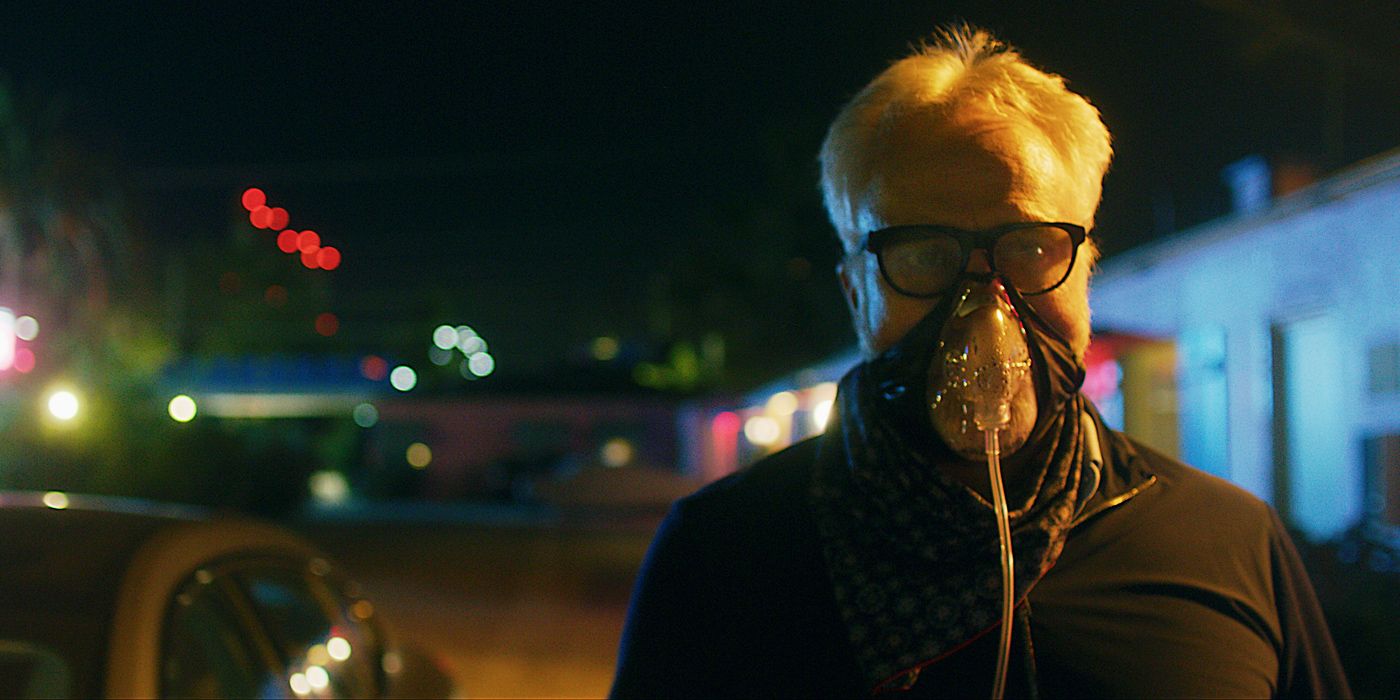As one of the first Hollywood films to be made during the pandemic, Songbird is a sci-fi thriller from writer/director Adam Mason and producer Michael Bay. Set in a dystopian future, the film follows the love story between an immune courier, Nico (KJ Apa), and a quarantined artist, Sarah (Sofia Carson),. With a Romeo and Juliet vibe, the couple has never physically met in the world ravished by the COVID-23 virus. When the Department of Sanitation threatens to drag Sarh to the quarantine zone, Nico must race against time to save her.
Speaking to CBR, Songbird director Adam Mason describes his unique filmmaking process, working with Michael Bay and geeks out about technology.
CBR: We've seen a lot of supernatural and dark thrillers from you in the past, with films like Blood River and The Devil's Chair, and Songbird really is no exception. What is it that attracts you to these dark films?
Adam Mason: I mean, as a filmmaker, I come out of the middle of nowhere in England. Growing up, I didn't know anyone who worked in film, and I certainly never met an actor or any of those kind of things. It's a very hard business to break into. So, in my early twenties, I kind of realized that the horror genre, in particular, is one where you didn't necessarily need a big budget, and you certainly didn't need access to big actors.
From a practical point of view, it was really the only kind of film that I could make so that I could get noticed. So, in my twenties and thirties, I made a few of those kinds of movies and ultimately, that was what got me noticed in Hollywood. I suppose at the time you start to form a reputation for making a certain kind of movie and that led to several more.
I think Songbird is somewhat of a departure from the horror genre. It's not really a horror movie. For me, it's more of a romantic thriller, I suppose.
Without spoiling too much, is there a scene you are most excited for audiences to see?
Yeah, for me, the whole movie is about human connection and how even when that's taken away from us, we still find a way to find it. Something that was really powerful to me during the first days of the lockdown was how thanks to technology I was still able to talk to my parents in England even though I'm on the West Coast of America. And thank God for that really because otherwise, I wouldn't have been able to communicate with them and all my family members and other loved ones.
And there was also my cousin, who is 30. He started having a relationship with a girl, an online relationship with a girl. And they'd been planning to get together and meet for the first time, and then the pandemic showed up, and they weren't able to physically see each other. But through FaceTime and these kinds of things, they were able to communicate every day. And I found that to be a hopelessly romantic notion, that love will prevail no matter what is going on in the world.
So, that was really much the inspiration behind Songbird and with Sarah and Nico. So, basically, the film was born among the first days of the lockdown in Los Angeles and my wife and partner and I came up with this idea.
Originally, it was going to be a monster movie, sort of like Cloverfield. And gradually it evolved into what it is today.
Which is very different.
Yeah, right. That is true.
Well, it's very cool. It's a good example of life imitating art in that respect.
Right, yes. It was very cathartic writing it because it was something we were all going through.
In that regard, obviously using a COVID virus hits close to home, is there a version of the script where the virus was unnamed, or you considered going in an alternative sci-fi direction with zombies or even more John Carpenter's The Thing?
Yeah, like I said in the original version, it was a monster, not a virus. Then the more we worked that as the pandemic was going on, the more we felt that it was kind of an invisible monster that you can't see, but it's everywhere was a lot more scary of a concept.
So, yeah, we played around with all different versions of it in the writing. But ultimately, the script was written in three days, and we went straight into production. We came up with the concept on the first day of the lockdown, and a few short months later, we were actually filming.
I understand you and your team employed "opportunistic filmmaking," can you tell me a little bit about what that looked like?
Originally we were planning on making the movie with friends of mine that were just actors that I've worked with in the past, and we were going to record all of it remotely with iPhones and iPads and laptops to send me the footage. Then I was going to cut together the movie remotely. But gradually, at the time, it all came to a more traditional approach.
The movie itself is kind of a hybrid between traditional filming technics and FaceTime conversations and those kinds of things. But all of it was born out of the necessity for everyone to be as safe as possible. The safety of the cast and crew was the foundation on which everything was built. The narrative of the script was completely formed on the practicality of how we were going to make it.
Gradually, at the time, the technology helped lead the way. So, we used a state of the art camera called a Komodo to promote a prototype version of that camera, which is a cinema camera that is the size of a coffee mug essentially. And that allowed us to completely strip down our crew. So, we only had that for photography and working the camera, and we didn't need any of the usual crew that you would have on a movie like Songbird.
Generally, there is a piece of technology call Frame IA, which meant that as we were filming the movie, all of the footage could be streamed in real-time onto people's iPads, laptops and phones. So, the producers or anyone that needed to watch it could watch what I was filming while I was filming. And this is technology that just didn't exist prior to Songbird really. That kind of innovation to me was really exciting as the movie itself, if not more so.
Yeah, that's a tech nerd's dream.
Yeah, it really was. It's quite incredible, like how I was saying I was able to communicate with my family 6,000 miles away while this horrible year was playing out. We kind of indulged that kind of technology with the movie itself.
Along the same line, Sofia Carson is quoted as saying that the "noninterference" approach made her forget she was "shooting a movie in the most beautiful way." Considering it was received positively by the actors, would you consider using in future projects, this noninterference or hybrid method you described?
Definitely, yeah. It's actually something I've done on several other movies over the years. I come from a guerrilla filmmaking background, where I normally do most of the roles myself. You know, I do the lighting and camera myself. I edit, and I do a little bit of everything. So, with Songbird, I adapted a lot of those things I've done in the past.
I've also done movies that I've rehearsed like you would a stage play. When the actors come on set, I like to remove the equipment and there usually isn't the crew you'd normally have on a major Hollywood movie. And I allow the actors to go anywhere. They don't have to hit a mark, or if they want to try one thing in one take and another thing in another take, I really encourage that kind of thing.
So, it's quite an experimental approach I used on Songbird because we had to because we couldn't have a large crew or special lights or really any equipment except for the camera essentially. It wasn't like we could have a crane or dolly or any of those things that we would normally have.
But for me, that was an incredibly freeing thing because I could put all of my attention into the performances and the actors themselves. So, even though we shot the movie in an incredibly short amount of time — we did the bulk of it in 17 days — I was actually able to really focus in on the performances. That's what I think Sofia is referring to in her quote.
Wow. 17 days is amazing.
Yeah, but it never felt rushed. The movie was a really low-budget movie, but normally with a lot of low-budget movies, the actors are used to having one or two takes, which I think is so counterintuitive to the creative process. So with a film like Songbird, it was like a stage play. There were no breaks and no lights being moved for an hour, or lenses being changed. We could just shoot and shoot and shoot. And that way, I'd be able to do as many takes as we needed. And consequently, we never felt rushed or short-changed. So, that's something I'm really proud of.
The Department of Sanitation head is played by Peter Stormare, who has an amazing history of playing convincing, creepy villains. Is there a reason you made the Department of Sanitation the real threat instead of the virus?
The virus itself was always really just the canvas that the painting was painted upon if you know what I mean? It's really just something that is happening in the background in the world that we created. So, the virus isn't the bad guy. It wasn't something I wanted to put too much attention into in terms of the narrative of the story.
I wanted it to be an old-fashioned story of good versus evil. So, the bad guys in the movie are other people essentially. And with the Department of Sanitation, basically everyone stopped doing their jobs and that left a very small amount of people who were immune and able to perform the essential tasks. Some of them, like Nico, were the good guys and some of them, like Peter Stormare's character Harland, the head of the Department of Sanitation, were the bad guys. He's basically someone who's a lowly garbage disposal guy who got promoted to be the head of the department. He's almost like a cartoon bad guy in a lot of ways.
He was amazing. He did a great job.
Thank you. He's one of my favorite actors, so it was a pleasure to get to work with him. And he didn't disappoint. He was absolutely incredible, I thought.
Yes, he is very convincing, which is a compliment, but also kind of scary if you are good at playing villains.
Yeah, right. It's funny because he's one of the sweetest men I've ever met in my life. He couldn't be as scary in real life. But yeah, he is a fantastic actor.
Michael Bay is known for his high-action films. Can you tell me what it was like working with him, especially on a film that didn't rely on his trademark special effects?
Michael Bay is someone I've looked up to as a filmmaker pretty much my entire adult life. So, getting the opportunity to work with him was really a dream come true and very surreal, actually. He was like a mentor to me, which is something I've never had in the 20 years that I've been doing this. And having that kind of mentorship was quite remarkable, really.
I feel like I've learned more in five months when I was working with him on the movie than I have in 20 years. It was like going back to film school again. Just seeing how he shoots on set is very informative for me. And then he was incredibly involved in the post-production. So, just getting a glimpse inside his mind and how he puts his movies together is an experience that I'll never forget and that I'm grateful for.
It was wonderful. You know, the original plot of the movie was 2 ½ hours long, and the script that we filmed was over 140 pages long. So, the first cut was much more character-based movie. So, with Michael, I was able to see how he looks at things from a blockbuster point of view. And with his help, we formed the movie into this more robust type of film.
As you said, you're a man of many hats. I know you've done directing and screenwriting, but is there a hat you like to wear best?
I really enjoy the entire process from start to finish. I love having an idea and seeing it all the way through to it being completed, whether it's a music video or short film or a movie like Songbird. To me, I just love every aspect of it. If I had to choose one, I'm a real nerd when it comes to cameras and technology. So, I obviously love that side of it. So for me, with Songbird, for example, this prototype camera that we used, that to me, I was just geeking out the whole time.
It's amazing to me how you can put together a movie that looks like a traditional blockbuster just with the very basic resources and equipment that anyone can really get their hands on. You can basically make a movie with your iPhone these days. You can write it on Final Draft, and you can film it with the three-camera lense that it has on it, and then you can edit it and record music with GarageBand. It's pretty amazing, really, what you can do.
Directed by Adam Mason, Songbird stars K.J. Apa, Sofia Carson, Peter Stormare, Demi Moore, Bradley Whitford, Craig Robinson, Alexandra Daddario and Paul Walter Hauser. The film is available Friday, Dec. 11 on VOD.



